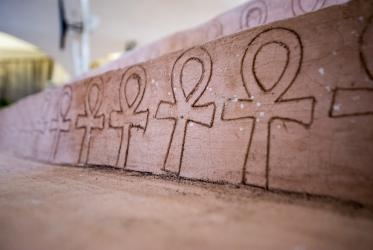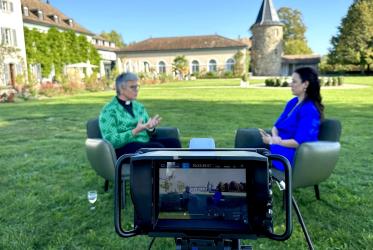Two presentations were made by members of the Faith and Order Commission: “Communion and Koinonia in The Church: Towards a Common Vision” by Rev. Dr Ellen Wondra, and “Visible Unity and Mutual Recognition: from Baptism, Eucharist and Ministry to The Church: Towards a Common Vision and beyond” by Rev. Dr Susan Durber.
During the webinar, Durber, moderator of the WCC Faith and Order Commission, said that, from its founding in 1948, the WCC has expressed its vocation in calling the churches to visible unity
“It’s not enough just to say we have invisible unity, unity in theory”, she said. We need it “in practical, visible, tangible ways”: unity “must be incarnate”.
Rev. Dr Sotiris Boukis, member of the Commission on Faith and Order and moderator of the webinar discussion, framed several questions that speakers and participants could explore, such as: “What does it mean to live in communion when we are so diverse?”
Boukis said he believed the webinar helps us hear what the churches are saying. “I think we got a very broad and very interesting understanding of what is happening in all the responses,” he said.
Wondra, who served as an co-editor of “Churches Respond to The Church: Towards a Common Vision," reflected that, over the past 20 to 30 years, many church leaders, ecumenists and theologians have found it very encouraging and helpful to think of church unity in terms of communion. “When we are in communion with God, we are not God and God is not us—but we are one,” said Wondra. “This real but imperfect communion is what ecumenism is always, by the Grace of God, trying to deepen and expand.”
Rev. Canon Dr John Gibaut, president, provost and vice-chancellor of Thorneloe University and former director of the WCC Commission on Faith and Order, expressed deep appreciation for both the churches’ responses and the interpretation of those responses. “You have given the church and the theological community a great gift,” he said, referring to the work of his colleagues.
But Gibaut also expressed deep concern over the small number of responses.
“From Latin America, not a single response although the text was translated into both Portuguese and Spanish,” he said. “Another huge disappointment for me personally was the low number of Anglican responses—eight altogether.”
The webinar was the second in a series that analyses some 80 responses to the convergence document The Church: Towards a Common Vision, published in 2013.
The series, which will comprise eight webinars, is being produced by the commission’s study group on ecclesiology. With the first three webinars planned for 2021, the remaining will take place in 2022 leading up to the WCC 11th Assembly in Karlsruhe.
Between 2015 and 2020, the study group of Faith and Order commissioners working on ecclesiology met regularly to read, analyse and reflect together on the responses to The Church: Towards a Common Vision. . They identified 16 key themes or issues often raised by the responses, and produced papers on each of these.






